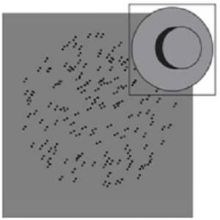 Training is understood to optimize neural circuits that process scene features (e.g., orientation) for particular purposes (e.g., judging position). Yet, learning is most beneficial when it generalizes to other settings and it is critical in recovery after adversity, challenging understanding of the circuitry involved. Here we use repetitive transcranial magnetic stimulation (rTMS) to infer the functional organization supporting learning generalization in the human brain. First, we show dissociable contributions of the posterior parietal cortex (PPC) vs. lateral occipital (LO) circuits: extracting targets from noise is disrupted by PPC stimulation in contrast to judging feature differences that is affected by LO rTMS. Then, we demonstrate that training causes striking changes in this circuit: after feature training, identifying a target in noise is not disrupted by PCC stimulation but instead by LO stimulation. This indicates that training shifts the limits on perception from parietal to ventral brain regions and identifies a critical neural circuit for visual learning. We suggest that generalization is implemented by supplanting dynamic processing conducted in the PPC with specific feature templates stored in the ventral cortex.
Training is understood to optimize neural circuits that process scene features (e.g., orientation) for particular purposes (e.g., judging position). Yet, learning is most beneficial when it generalizes to other settings and it is critical in recovery after adversity, challenging understanding of the circuitry involved. Here we use repetitive transcranial magnetic stimulation (rTMS) to infer the functional organization supporting learning generalization in the human brain. First, we show dissociable contributions of the posterior parietal cortex (PPC) vs. lateral occipital (LO) circuits: extracting targets from noise is disrupted by PPC stimulation in contrast to judging feature differences that is affected by LO rTMS. Then, we demonstrate that training causes striking changes in this circuit: after feature training, identifying a target in noise is not disrupted by PCC stimulation but instead by LO stimulation. This indicates that training shifts the limits on perception from parietal to ventral brain regions and identifies a critical neural circuit for visual learning. We suggest that generalization is implemented by supplanting dynamic processing conducted in the PPC with specific feature templates stored in the ventral cortex.

